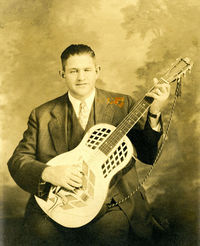Annotation:New River Train: Difference between revisions
(Created page with "=='''Back to [[{{BASEPAGENAME}}]]'''== ---- <p><font face="garamond, serif" size="4"> '''NEW RIVER TRAIN.''' AKA - "Green River Train." Old-Time, Breakdown & Song. USA; We...") |
No edit summary |
||
| Line 3: | Line 3: | ||
<p><font face="garamond, serif" size="4"> | <p><font face="garamond, serif" size="4"> | ||
'''NEW RIVER TRAIN.''' AKA - "[[Green River Train]]." Old-Time, Breakdown & Song. USA; Western N.C., Southwestern Va. D Major. The melody has been described as a "Blue Ridge Mountain standard" and has been recorded numerous times since the first recorded version by guitarist Henry Whitter in 1924, although Fields Ward (1911-1987) remarked that he believed his southwest Virginia musical family learned it from regional sources around the year 1895. Subsequent recordings were by Kelly Harrell in New York in 1925 (backed by a 'string band' made up of the city's studio musicians--hear the recording below), Sid Harkreader a bit later in 1925 (playing guitar to accompany his vocal, rather than playing his fiddle), and several different recordings by Vernon Dalhart. Blech goes on to identify Ernest Stoneman's recording with the Sweet Brothers on July 9th, 1928 (who was inspired by Whitter to record) and two more versions by Harrell, in 1925 and 1926. A recorded oddity was the 1927 version of the song in the key of 'G' by the South Georgia Highballers (released as "[[Green River Train]]"), who used a musical saw as accompaniment. Nearly all early versions were set in the key of 'D', although it is occasionally heard in 'G'. | '''NEW RIVER TRAIN.''' AKA - "[[Green River Train]]." Old-Time, Breakdown & Song. USA; Western N.C., Southwestern Va. D Major. The melody has been described as a "Blue Ridge Mountain standard" and has been recorded numerous times since the first recorded version by guitarist Henry Whitter in 1924, although Fields Ward (1911-1987) remarked that he believed his southwest Virginia musical family learned it from regional sources around the year 1895. Subsequent recordings were by Kelly Harrell in New York in 1925 (backed by a 'string band' made up of the city's studio musicians--hear the recording below), Sid Harkreader a bit later in 1925 (playing guitar to accompany his vocal, rather than playing his fiddle), and several different recordings by Vernon Dalhart. Blech goes on to identify Ernest Stoneman's recording with the Sweet Brothers on July 9th, 1928 (who was inspired by Whitter to record) and two more versions by Harrell, in 1925 and 1926. A recorded oddity was the 1927 version of the song in the key of 'G' by the South Georgia Highballers (released as "[[Green River Train]]"), who used a musical saw as accompaniment. Nearly all early versions were set in the key of 'D', although it is occasionally heard in 'G'. | ||
[[File:whitter.jpg|200px|thumb|left|Henry Whitter]] | |||
<br> | <br> | ||
<br> | <br> | ||
Revision as of 20:54, 4 May 2014
Back to New River Train
NEW RIVER TRAIN. AKA - "Green River Train." Old-Time, Breakdown & Song. USA; Western N.C., Southwestern Va. D Major. The melody has been described as a "Blue Ridge Mountain standard" and has been recorded numerous times since the first recorded version by guitarist Henry Whitter in 1924, although Fields Ward (1911-1987) remarked that he believed his southwest Virginia musical family learned it from regional sources around the year 1895. Subsequent recordings were by Kelly Harrell in New York in 1925 (backed by a 'string band' made up of the city's studio musicians--hear the recording below), Sid Harkreader a bit later in 1925 (playing guitar to accompany his vocal, rather than playing his fiddle), and several different recordings by Vernon Dalhart. Blech goes on to identify Ernest Stoneman's recording with the Sweet Brothers on July 9th, 1928 (who was inspired by Whitter to record) and two more versions by Harrell, in 1925 and 1926. A recorded oddity was the 1927 version of the song in the key of 'G' by the South Georgia Highballers (released as "Green River Train"), who used a musical saw as accompaniment. Nearly all early versions were set in the key of 'D', although it is occasionally heard in 'G'.

Another version of the song is called "Honey Babe", and differs only in the chorus.
Source for notated version:
Printed sources:
Recorded sources: Bear Family Records, The Monroe Brothers (a reissue of the original 1936 recording). Bluebird B-6645 (78 RPM), The Monroe Brothes (1936). Columbia 15032-D (78 RPM), Vernon Dalhard (c. 1925). County 778, Tommy Jarrell - "Pickin' on Tommy's Porch" (1984. Learned from the playing of his father, fiddler Ben Jarrell). Front Hall FHR-037, Mark Graham - "Natural Selections" (1987). OKeh 40143 (78 RPM), Henry Whitter (1924). OKeh 45579 (78 RPM, Crazy Hillbillies Band (1936). Rounder CD 0383, Mike Seegar and Paul Brown - "Down in North Carolina." Vanguard CD, Doc Watson, Fred Price & Clint Howard. Victor 19596 (78 RPM), Kelly Harrell (1925). Vocalion 15035 (78 RPM), Sid Harkreader (1925).
See also listing at:
Jane Keefer's Folk Music Index: An Index to Recorded Sources [1]
Hear the Monore Brothers' 1936 recording on youtube.com [2]
Hear Kelly Harrell's 1925 recording at National Jukebox [3]
